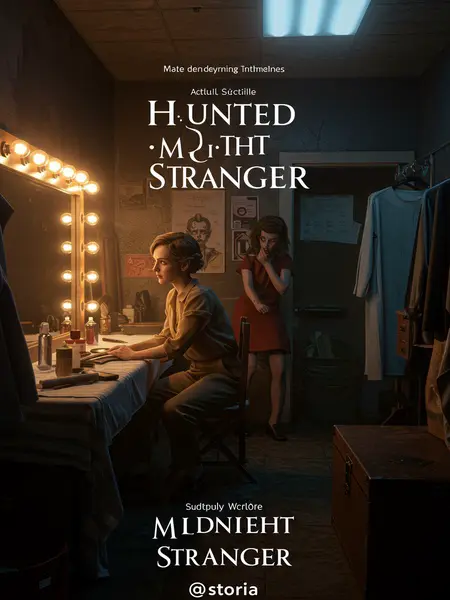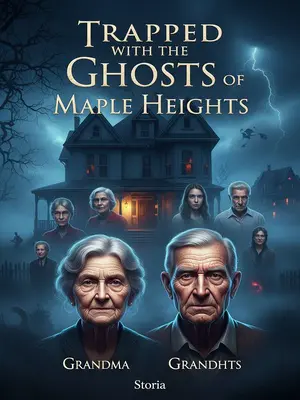Chapter 3: Derek's Midnight Lessons
Shortly after, the troupe was tapped to perform at the 1956 Fourth of July gala. They picked their best numbers, drilled each routine, and brought in a coach to whip everyone into shape. Attendance was tracked, and nobody dared slack off—not with the mayor watching.
Derek, the young male lead, was cast in a featured role. He’d later become the inspiration for Will Quinn in "Song at Midnight."
Derek was new to the city, just a few years out of high school—wide-eyed, hungry, taping Broadway posters to his wall. Later, folks would say he was the spitting image of Will Quinn—same shy smile, same stubborn chin.
Eager to prove himself, Derek put in long hours, practicing late into the night.
Long after the others left, Derek’s voice echoed through the dark halls. He was determined to lose the "rookie" tag and earn his spot.
But Derek, a newcomer from the South, struggled with the Chicago accent. Every time he opened his mouth, he worried his Tennessee drawl sounded like a punchline instead of a performance.
He’d grown up singing gospel in Tennessee, his vowels round and his rhythms gentle. Here, every note twisted just a bit wrong. Castmates teased, the director frowned, and Derek burned to get it right.
One night in late March, Derek stayed late, chasing the perfect Chicago accent until midnight crept in.
The wall clock was stuck at 11:48, but outside, the city was silent. Derek didn’t notice, lost in repetition and tapping out rhythms on the battered piano bench.
Back then, Chicago’s hydropower plant wasn’t running yet, so most folks still used oil lamps at night. As Derek’s lamp sputtered low, he started to rise for more oil—when a man’s voice drifted out of the darkness near the stage: "Your singing just now wasn’t quite right."
A chill crawled up Derek’s spine. The lamp flickered. He could almost taste the dust in the air as the stranger’s shadow stretched across the stage.
Derek froze, unsure if he’d imagined it. In a daze, he watched a figure slip out from behind the curtain—silent, gliding, as if the old boards didn’t dare creak.
The figure wore an opera costume from before the war, his face hidden in shadow, his movements smooth and silent. The air around him seemed to ripple, unreal.
Derek was paralyzed with fear. The man said, "This line should be sung like this," and began to sing.
The stranger’s voice filled the empty theater—achingly clear, heartbreakingly beautiful. It was the kind of performance that made you want to weep, the kind that left the air humming long after the last note faded.
That night, Derek had been practicing "The Peach Blossom Fan." The stranger’s rendition was leagues beyond his own—especially the accent, which was so perfectly Chicago Derek ached to copy it.
Derek listened, torn between envy and gratitude. Every note was precise, every phrase delivered with grace. He tried to soak up every nuance, desperate to learn.
In those days, you couldn’t get a master’s help unless you had family or luck. Derek had neither, so when this mysterious man offered to teach, fear and longing fought for space in his heart.
Despite the terror, Derek’s hunger to improve won out. He nodded, barely breathing, as the man corrected his posture and guided him through tricky lines. It was like finding a secret door in a place he thought he knew.
Every night after, Derek waited for the man, half asleep with anticipation.
He’d nap after dinner, set an alarm, and creep into the moonlit theater, hoping for the stranger’s return. Each night, his heart pounded with a mix of excitement and dread.
The man always appeared when Derek was half between waking and dream. Derek didn’t dare ask questions—this was their unspoken pact.
It became a ritual: Derek, the empty theater, and lessons that felt as real as the calluses on his hands. The stranger only spoke of music, as if any other topic would break the spell.
Derek’s skills grew quickly, but so did his unease. In those days, secrets were dangerous—no one was allowed to keep things from the group.
His castmates started to notice: Derek’s confidence, his crisp notes, his nearly perfect accent. But at night, guilt gnawed at him. He felt the weight of his secret, afraid he was breaking some sacred rule.
He never saw the man clearly in the light, but the lessons stuck. Some mornings, Derek wondered if he was losing his mind.













